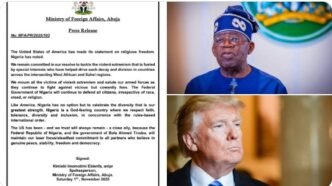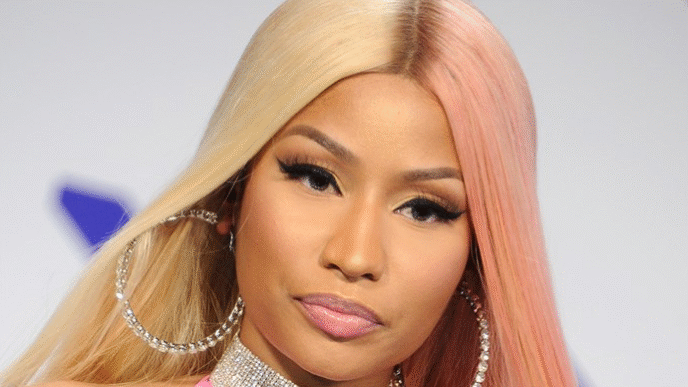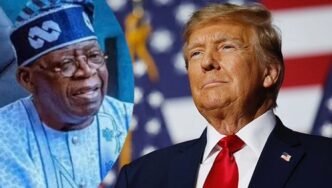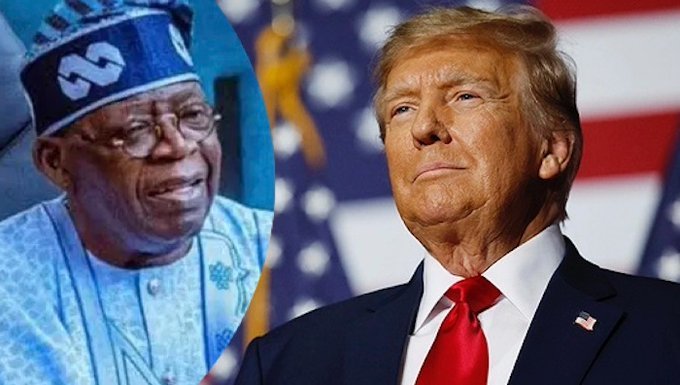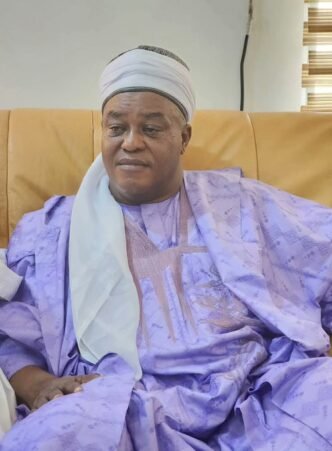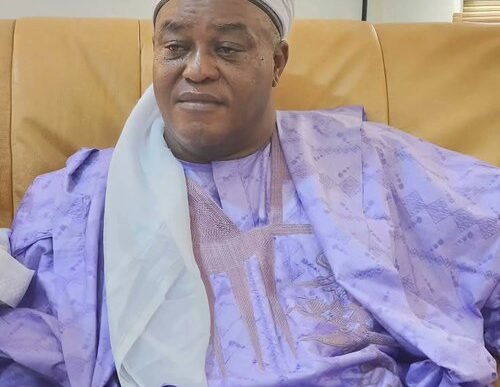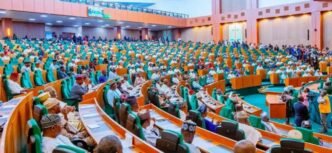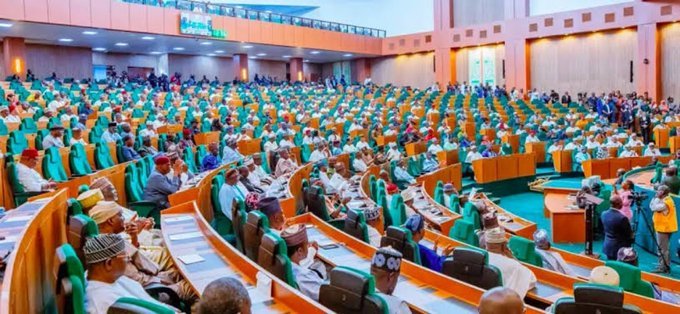Abuja — November 1, 2025
The Federal Government of Nigeria, through the Ministry of Foreign Affairs, has issued a strong rebuttal to recent comments by former United States President Donald Trump and American lawmakers alleging a “Christian genocide” in Nigeria. The Nigerian government described the claims as “false, inflammatory, and grossly misleading,” insisting that the country’s security challenges are complex and not rooted in religion.
The controversy erupted after Donald Trump, while addressing a conservative Christian gathering in Washington, D.C., declared that “Christianity is facing an existential threat in Nigeria,” accusing the Nigerian government of failing to protect Christian communities. He went further to announce that the United States was designating Nigeria as a “Country of Particular Concern” under its International Religious Freedom Act — a move that could open the door for possible sanctions.
Trump’s remarks were amplified by several American lawmakers, including Senator Ted Cruz, who recently sponsored the Nigeria Religious Freedom Accountability Act of 2025. The bill proposes sanctions on Nigerian government officials allegedly complicit in the killing or persecution of Christians in the country.
But in a swift and emphatic response, the Ministry of Foreign Affairs in Abuja dismissed the allegations as politically motivated and detached from Nigeria’s current realities. The ministry maintained that the Nigerian government remains committed to protecting all citizens, regardless of faith or ethnicity.
Nigeria Rejects “False Narrative” of Religious Genocide
In an official statement released late Friday, the Ministry of Foreign Affairs described Trump’s comments as “deeply regrettable and inconsistent with verifiable facts on the ground.” The ministry emphasized that Nigeria is a multi-religious, multi-ethnic federation where both Christianity and Islam flourish side by side, with constitutional guarantees for freedom of religion and worship.
“The Government of the Federal Republic of Nigeria rejects in its entirety the unfounded allegations of a so-called ‘Christian genocide.’ Such characterization distorts the nature of the security challenges confronting Nigeria and risks inflaming divisions among our citizens,” the statement read in part.
Foreign Affairs Minister Yusuf Maitama Tuggar underscored that while Nigeria faces terrorism, banditry, and communal violence, these conflicts are driven by complex factors such as resource competition, poverty, and climate stress — not by religious persecution.
“There is no evidence whatsoever to suggest that the Nigerian state is engaged in or tolerates the persecution of any religious group,” Tuggar said. “Acts of violence are condemned regardless of the victims’ faith. Both Christians and Muslims have suffered immensely from terrorism and armed criminality across various parts of the country.”
Government Decries “Inflated and Fabricated Figures”
The Nigerian government also challenged the statistics often cited by international advocacy groups and some U.S. politicians, who claim that over 50,000 Christians have been killed in Nigeria since 2009. According to the Ministry, those figures are “wild exaggerations without any credible data sources.”
Officials explained that while violence has indeed claimed thousands of lives in the last decade, victims have included adherents of all faiths and ethnicities. Government data, they said, do not support the assertion that Christians are being systematically targeted for elimination.
“The figures being quoted are simply absurd,” the Ministry noted. “Our security agencies maintain records of attacks by non-state actors such as Boko Haram, ISWAP, and bandits. These groups have attacked mosques, churches, schools, and markets indiscriminately. To describe these atrocities as ‘Christian genocide’ is not only inaccurate but deeply unfair to the victims of all backgrounds.”
Nigeria Seeks Diplomatic Engagement, Not Confrontation
Following Trump’s remarks, the Federal Government announced that it would open diplomatic discussions with the United States to clarify misconceptions about the situation in Nigeria. Officials said the Nigerian Embassy in Washington has been directed to engage with relevant U.S. authorities, faith-based organizations, and think tanks to present a more balanced view of the realities in the country.
The government’s approach, according to sources within the Ministry, is to address the issue diplomatically rather than through public confrontation. However, the tone of Friday’s statement made it clear that Nigeria views the genocide label as a dangerous and divisive narrative.
“We remain open to constructive dialogue with the United States and all international partners,” the Ministry stated. “However, we will not tolerate the dissemination of falsehoods that undermine Nigeria’s unity or portray our government as complicit in crimes it has consistently fought to eradicate.”
National Assembly and Civil Society Back FG’s Position
Nigeria’s National Assembly has also thrown its weight behind the Foreign Ministry’s position. Lawmakers in both chambers passed motions condemning the “Christian genocide” narrative as misleading and detrimental to Nigeria’s global image.
During plenary on Thursday, the House of Representatives called on the U.S. Congress to resist one-sided reports and instead dispatch an independent fact-finding mission to Nigeria. The lawmakers argued that the violence in Nigeria’s North-Central and North-West regions stems from criminal activities, insurgency, and farmer-herder clashes — not organized religious persecution.
Civil society organizations and religious leaders in Nigeria have echoed similar sentiments. The Christian Association of Nigeria (CAN) acknowledged that Christians have suffered attacks but agreed that the term “genocide” is inaccurate and unhelpful. Muslim groups, including the Jama’atu Nasril Islam (JNI), expressed support for interfaith dialogue, stressing that both faiths have suffered devastating losses from terrorism.
Analysts Warn of Diplomatic Fallout
Foreign policy experts have warned that the U.S. designation of Nigeria as a “Country of Particular Concern” could have serious diplomatic and economic consequences. Such designation, under U.S. law, allows the White House to impose sanctions, restrict arms sales, or limit foreign assistance.
Dr. Kabiru Adamu, a security analyst based in Abuja, described the development as a potential strain on U.S.–Nigeria relations. “This comes at a time when both nations are cooperating on counterterrorism and regional stability. If Washington moves forward with sanctions, it could undermine joint operations and intelligence sharing,” he said.
He also noted that Trump’s statement appears to reflect a broader political agenda targeting African nations ahead of the U.S. presidential elections. “Nigeria should continue to engage diplomatically but must also assert its sovereignty and correct false impressions through factual reporting and transparency,” Adamu added.
Government Reaffirms Commitment to Protect All Citizens
In its concluding remarks, the Ministry of Foreign Affairs reiterated President Bola Tinubu’s administration’s commitment to protecting every Nigerian, regardless of religious or ethnic identity. The government pointed to ongoing military operations against Boko Haram and bandits, community peacebuilding efforts, and the resettlement of displaced persons as evidence of its dedication to restoring peace and stability.
“The Federal Government’s focus remains on securing every inch of our territory, rehabilitating affected communities, and fostering national unity,” the statement emphasized. “Nigeria rejects any external narrative that seeks to divide our people along religious lines.”
The ministry further appealed to the international media and human rights organizations to verify information before publishing sensational claims that could worsen religious tension.
Conclusion
The clash between Nigeria and the United States over claims of a “Christian genocide” underscores the deep sensitivities surrounding religious identity and security narratives in Africa’s most populous country. While violence in Nigeria has undeniably taken a heavy toll on Christian communities, the Nigerian government insists that the crisis cannot be reduced to a simplistic religious conflict.
As diplomatic talks continue, the Ministry of Foreign Affairs has called for evidence-based reporting and international cooperation rooted in mutual respect. With both countries standing as strategic partners in Africa, the next steps will determine whether this controversy evolves into a prolonged diplomatic rift or a moment for renewed understanding between Abuja and Washington.

